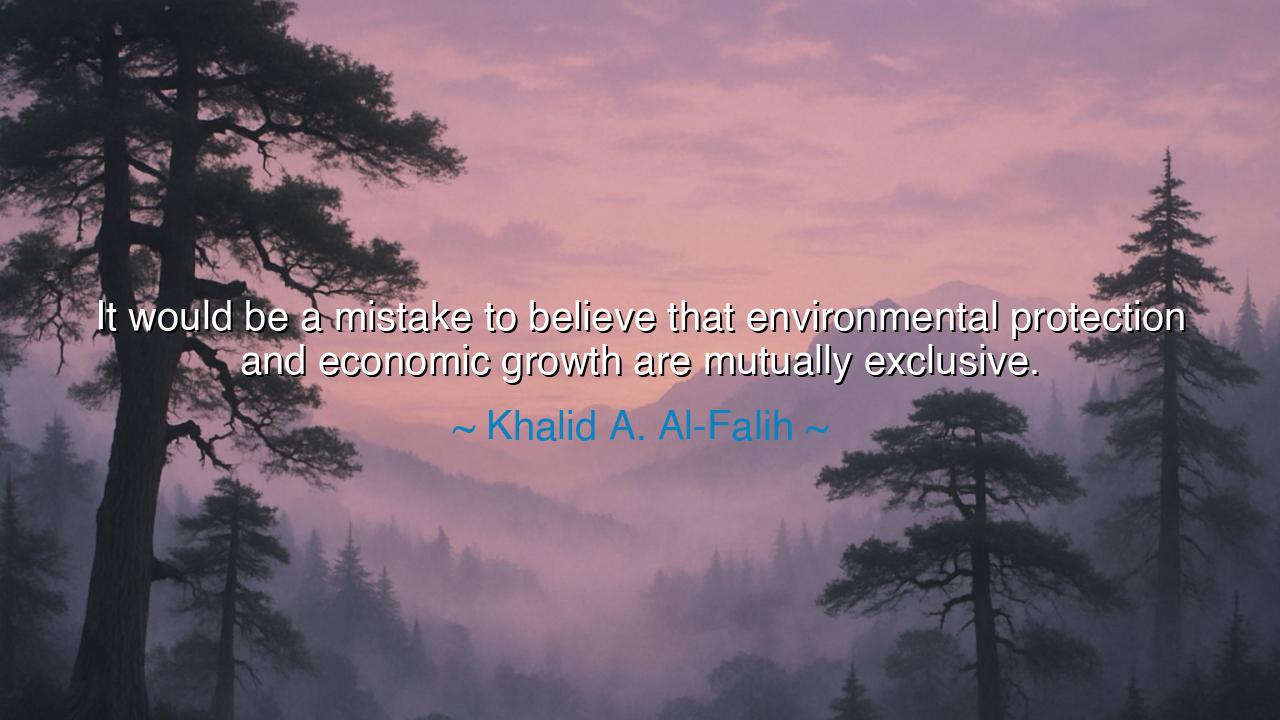
It would be a mistake to believe that environmental protection
It would be a mistake to believe that environmental protection and economic growth are mutually exclusive.






Khalid A. Al-Falih once proclaimed with conviction: “It would be a mistake to believe that environmental protection and economic growth are mutually exclusive.” In this brief but powerful statement lies a wisdom that transcends our age, echoing the eternal balance sought by all societies—that prosperity and stewardship, wealth and responsibility, progress and preservation, are not enemies but partners. His words stand as a shield against the false belief that we must choose between the health of the earth and the flourishing of human industry.
To protect the environment is to guard the foundation upon which all economies stand. Without clean water, fertile soil, and breathable air, no empire, no market, no nation can endure. And yet, too often the pursuit of growth has been imagined as a war against nature, as though forests and rivers were obstacles to conquer. Al-Falih reminds us that this is folly. The ancients knew that the farmer who ravages his land soon has nothing left to reap; only the one who nurtures the soil finds harvest for generations. So too with nations: economic wealth without environmental care is like building a palace upon sand.
Consider the story of the Netherlands in the 20th century. Faced with floods and rising waters, the Dutch did not choose between safety and growth; they wove them together. Through innovation, dikes, and water management, they transformed danger into opportunity, creating a thriving nation where others might have seen only disaster. Their example embodies Al-Falih’s wisdom: when human ingenuity respects and works with nature, both prosperity and protection flourish.
Yet history also warns us of the opposite. The Dust Bowl of the 1930s in America came from reckless farming that stripped the soil of strength. In pursuit of short-term gain, the land was exhausted, and entire communities were left destitute. This calamity revealed the truth of Al-Falih’s words by contrast: when we believe growth can be pursued without stewardship, we are deceived. What seems like progress soon crumbles into ruin. True growth must be aligned with care, or it is no growth at all.
Al-Falih’s insight also speaks to the future. Today, new technologies—solar power, wind energy, carbon capture, sustainable agriculture—show that innovation can both fuel economies and protect the earth. What once seemed impossible is now within reach, if only leaders and peoples embrace the union of prosperity and responsibility. His words are not only observation but also prophecy: the civilizations that thrive in the centuries ahead will be those that weave environmental protection into the fabric of their economic growth.
The lesson is plain for each of us: do not believe the lie that you must choose between thriving and protecting. In your own life, in your work, in your community, seek choices that honor both. Support businesses that balance profit with stewardship. Use technology not merely for convenience, but for conservation. Teach your children that wealth is hollow if it is built upon waste, but powerful if it is bound to wisdom.
So let these words echo as a guiding law: prosperity and protection are not rivals, but allies. It is indeed a mistake to set them against each other, for they are two wings of the same bird. With only one, the bird falters and falls; with both, it rises and soars. Khalid A. Al-Falih’s teaching is thus a call to courage and clarity: to build a future where the earth is cherished and economies are strong, where human progress and natural harmony walk hand in hand, and where generations yet unborn inherit not ashes, but abundance.






AAdministratorAdministrator
Welcome, honored guests. Please leave a comment, we will respond soon